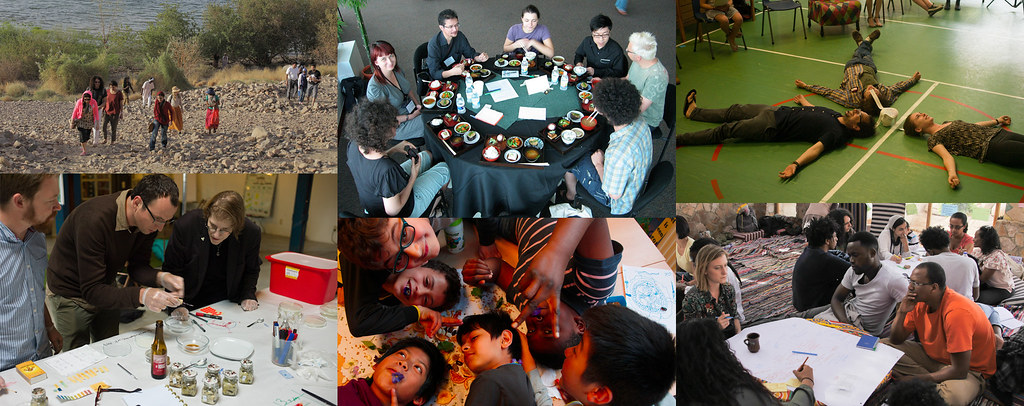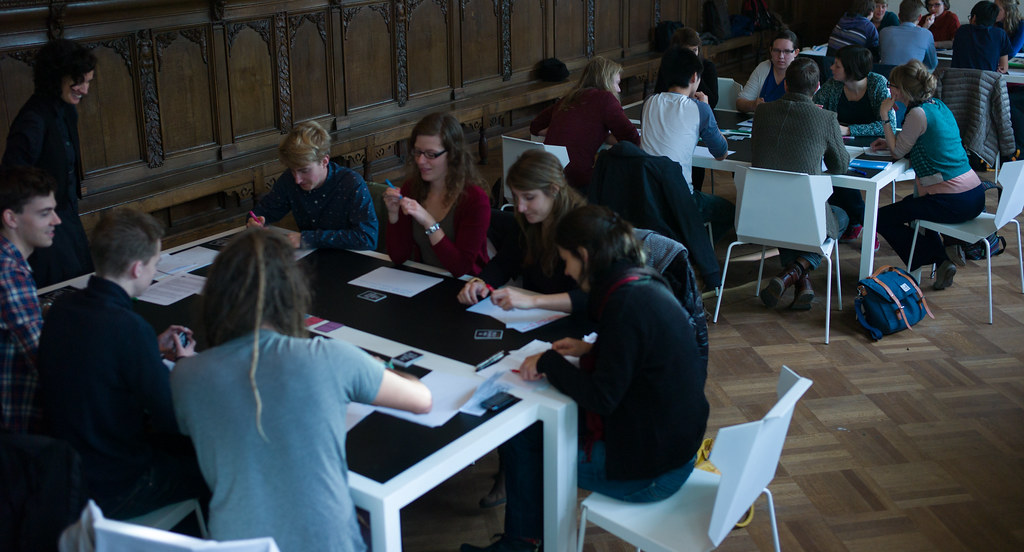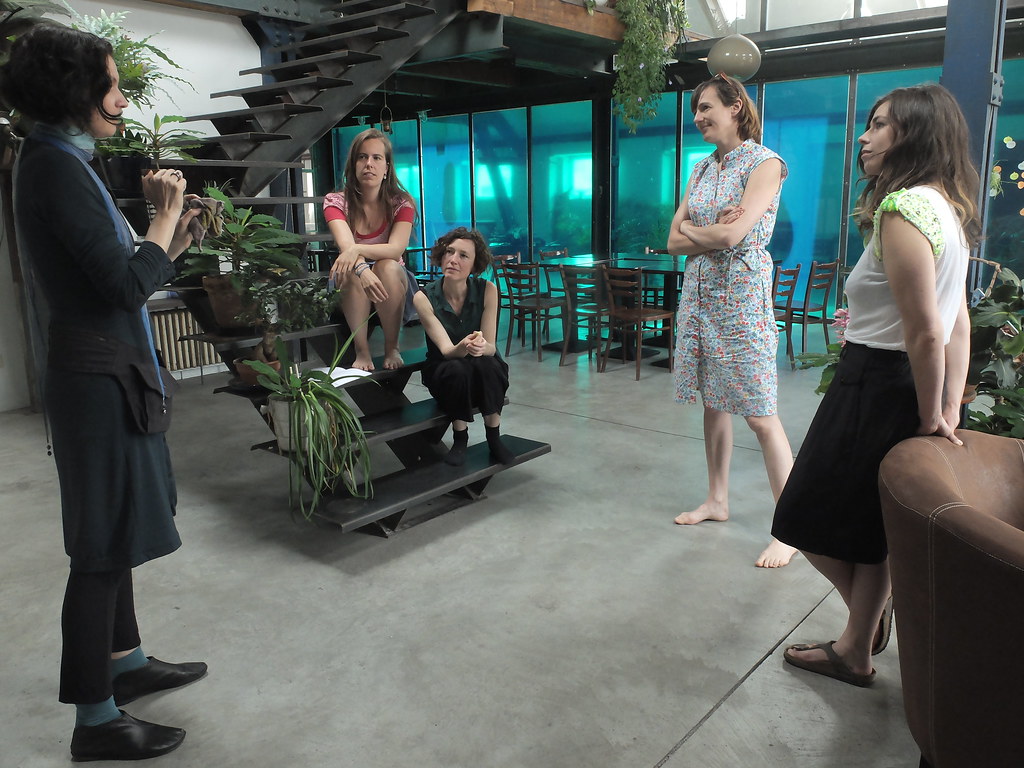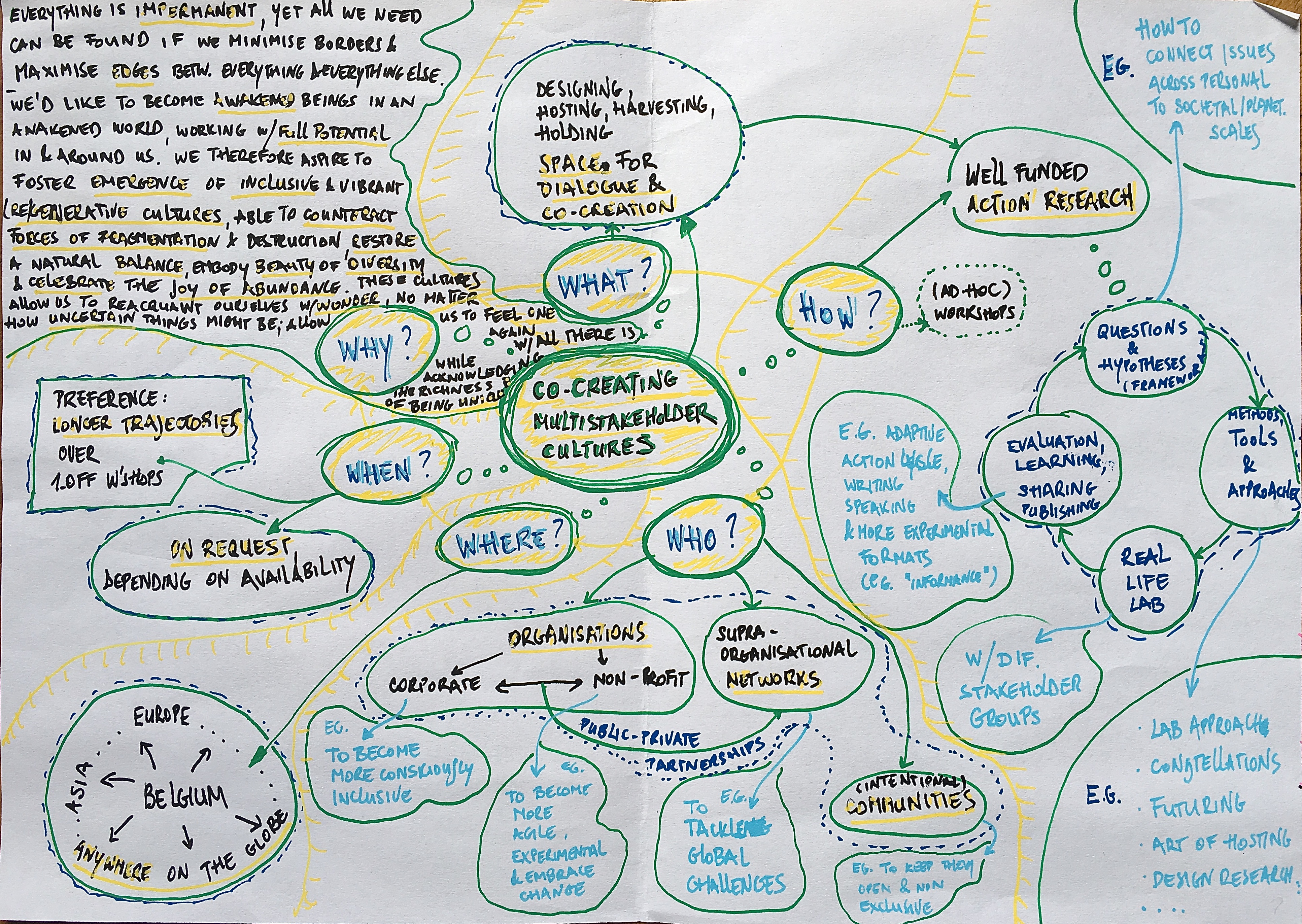Table of Contents
Integrative Process Facilitation
As process facilitators, we guide groups of people to effectively work together. Facilitation is particularly valuable for tackling complex issues through dialogue and co-creation in participatory settings, such as workshops, meetings or collaborative projects. We take care of the “how” so you can focus on the “what” and “why” of a collaborative pursuit.
The creative process is at core of our work. It encourages curiosity and guides people from the uncertainty of “not knowing” through creative leaps toward meaningful collective insights. We design immersive experiences including all senses. Our facilitation style draws on the art of improvisation to navigate through complexity, allowing us to adapt to unexpected situations and changing conditions.
The strength of our group lies in its diversity. The expertise of our facilitators includes the arts and sciences, futures and education, community- and organisational development. The transdisciplinary nature of our facilitation teams allows us to work across sectors. We custom design all processes with our clients and partners.
Our participatory processes are an embodiment of our skills and personalities. We understand the importance of alignment between personal and collective development, intellectual and embodied learning. We are process facilitators with a zeal for systemic transitions, where we can contribute to substantial transformations and generative long-term impact.
Read more about our work here

See also: Integrative Process Facilitation on the FoAM site
What is it?
Process facilitation guides groups of people to effectively and creatively work together in participatory situations, such as workshops, meetings or collaborative projects.

Why?
We live in uncertain times that call for alternatives to the status quo. As Einstein said, “A new type of thinking is essential if mankind is to survive and move toward higher levels.” Yet, as in all uncertain times, we also see the rise of conservatism, xenophobia, sectorial entrenchment and other forces of destructive fragmentation. We believe that such tendencies can be counteracted by fostering emergence of diverse and inclusive cultures. Cultures able to invigorate and (re)generate the ecological and social systems they interact with. Cultures seeking to find a dynamic balance between seemingly opposing opinions, systems and world-views. Where rigid borders become fertile edges. Where individuals can deploy their full potential for the benefit of the collective well-being. Where each person can experience a sense of belonging to a larger whole, while also appreciate the richness of being unique.
Why process facilitation?
Most collaborative pursuits deal with issues that are complex, urgent and important. People involved tend to be pressed for time and resources. It is therefore crucial that the collaboration makes the most of everyone’s presence and capacity. Facilitating participatory processes enables individuals and groups to learn from and with each other, tackle challenges from multiple perspectives and for multiple benefits.

What do we do?
We generate safe spaces for authentic dialogue and co-creation: we take care of “how” the conversation takes place, while participants focus on “what” the conversation is about. We craft participatory processes and design event flows to maximize engagement, creativity and learning. During and after the event, we synthesise the insights as a “harvest” of the process and the results.
Our guidance enables participants to align their intentions and reach meaningful outcomes, with a clear path from conversation to action; action that can serve each participant, the group, and the larger contexts they are part of. With process facilitation, we aim to bring out the full collective potential of groups, leading towards creation of inclusive and generative organisational cultures.
Our favorite challenges include:
- Transition processes, especially connecting personal and systemic transitions
- Multi-stakeholder alliances addressing complex issues, which cannot be resolved from one single worldview
- Futurecrafting to allow pro-active engagement with the uncertainty of futures
- Enhancing action-oriented pursuits with contemplative and reflective practices
- Intertwining thinking and doing, dialogue with ‘hands-on’ or ‘tinkering’ practices
We emphasise the importance of collaboration when addressing the complexity of such challenges. We therefore work as a facilitation team including our experts from diverse backgrounds. Long-term collaboration between facilitators and groups drastically increases the chances of success in addressing such challenges.
Who?

Who are we?
Our process facilitators have diverse backgrounds, including the arts, science, engineering and community- and business development. The transdisciplinary nature of our group allows us to work across sectors, taking advantage of our complementary skills and knowledge. We find common ground in our experience with the creative process in collaborative settings, such as artist collectives, maker spaces, design studios and (social and technological) innovation labs.
Hosting and process facilitation is our craft. Our facilitation services go beyond established methods and formats. We custom-design our contribution according to your needs, from a wide range of transdisciplinary tools and practices. We have the necessary skills and experience to offer a complete package, including design, co-ordination, facilitation, documentation and follow-up. Our artistic and creative expertise allows us to design immersive, aesthetically qualitative experiences, which stimulates multisensory and embodied learning.
We have extensive experience with collective creation, especially in very diverse groups. We understand the fragility and the power of group dynamics. We can help you build bridges between a range of personalities, disciplines, opinions in your group, to unleash its collective potential. Furthermore, our work with creative improvisation enables us to deal with the unexpected issues that inevitably arise in intensive group work.
All of us went through deep personal, professional or organisational transitions. We developed daily practices to increase our awareness of personal and interpersonal dynamics, which support and enrich our hosting skills. We don’t not simply apply methods we stored in our pre-frontal cortexes. We truly embody our hosting experience, and we can teach participants to do the same.
Who do we work with/for?
Our clients and partners come from a range of sectors and professional contexts, looking to transform their work to become more inclusive, agile, creative and sustainable. For example:
- Organisations: businesses, corporations, non-profit institutions, governments, co-operatives, entrepreneurs…
- Networks: multistakeholder initiatives, public-private partnerships, supraorganisational networks…
- Communities: creative collectives, communities of practice, intentional communities, community centres…
Where?
The majority of our practitioners live in Belgium, with Europe as our usual operating sphere. Several of us are global nomads able to work anywhere where we’re called to.
When?
Depending on request and availability of facilitators. Long-term programmes take precedence over one-off commissions.
Some of us work based on seasonal programming, in which spring and autumn tend to be the best periods for process facilitation.
Needs
What does process facilitation need from the hosting community?
- Access to potential clients and networks
- Communication and promotion of facilitation services
- People to co-host processes (experienced hosts, assistants, logistics support, (graphic) recorders…)
- (Optional) Space and facilities to host participatory processes
Offers
Why is process facilitation relevant for the hosting community? What learning will it bring?
- Visibility of the community in diverse sectors and networks
- A toolbox of frameworks, methods, techniques and approaches
- A portfolio of realised work (good for promotion, visibility as well as learning)
- Possibly a good source of income
- Testbed for other hosting practices (e.g. guided meditations, rituals, vision quests and other contemplative practices)
Process Facilitation Working Group
What is it?
A working group and community of practice for process facilitators and team coaches.
Why?
- To support and learn from each other’s practices,
- To collaborate, experiment and co-create,
- To widen our professional networks,
- To broaden our skills and knowledge.

How?
Support for individual practitioners by offering co-hosting opportunities, peer-mentoring and access to wide international and transdisciplinary networks. The longer term aim is for the group to become a supportive peer-learning environment, including:
- Network where aspiring and established process facilitators can meet and initiate collaborations.
- Lab/Testing ground for experimental techniques
- Studio for co-creation of participatory processes
- Toolbox of practical techniques and methods
- Safe zone and support group for the practitioners to tackle professional challenges
- Living archive of (research) questions, conceptual frameworks and theoretical underpinnings.
Where?
In Belgium (Brussels, Ghent) and online.
When?
- Regular face-to-face gatherings (regularity TBD)
- Continuous access to a collaborative space online (mailing list, “toolbox”, documentation repository…)
- Bilateral sessions (mentoring, co-creation, co-hosting), as needed
Needs
What does this working group need from the hosting community?
- Committed members
- Co-ordination
- Joint funding opportunities for long-term, larger scale projects
- (Optional) Space and facilities to host working group gatherings
Offers
Why is this working group relevant for the hosting community? What learning will it bring?
- Support for individual members
- Proof of concept for the larger hosting community of practice
- Process facilitation is at the core of the hosting community, whatever we learn in this group would be likely be relevant for other work-streams
- Action research cycle is an example of how to implement continuous learning in a practical context
- Ability to initiate and participate in larger scale and longer term (research) projects
- Access to wider professional networks, promotion of all hosting community activities
Meeting notes
- from December_2016 AKIN Gathering

